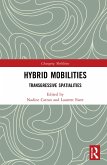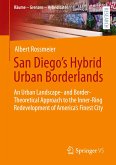Hybrid Labour
Measuring, Classifying, and Representing Workers at the Boundaries of Employment and Self-employment
Herausgeber: Murgia, Annalisa
Hybrid Labour
Measuring, Classifying, and Representing Workers at the Boundaries of Employment and Self-employment
Herausgeber: Murgia, Annalisa
- Gebundenes Buch
- Merkliste
- Auf die Merkliste
- Bewerten Bewerten
- Teilen
- Produkt teilen
- Produkterinnerung
- Produkterinnerung
This book advances the debate on the hybrid areas of labour by taking the case of work arrangements that destabilise the dichotomies between standard and non-standard work, and between self-employment and dependent employment.
Andere Kunden interessierten sich auch für
![Hybrid Mobilities Hybrid Mobilities]() Hybrid Mobilities168,99 €
Hybrid Mobilities168,99 €![Meanderings on the Making of a Diasporic Hybrid Identity Meanderings on the Making of a Diasporic Hybrid Identity]() Dulce María GrayMeanderings on the Making of a Diasporic Hybrid Identity48,99 €
Dulce María GrayMeanderings on the Making of a Diasporic Hybrid Identity48,99 €![San Diego's Hybrid Urban Borderlands San Diego's Hybrid Urban Borderlands]() Albert RossmeierSan Diego's Hybrid Urban Borderlands68,99 €
Albert RossmeierSan Diego's Hybrid Urban Borderlands68,99 €![Meanderings on the Making of a Diasporic Hybrid Identity Meanderings on the Making of a Diasporic Hybrid Identity]() Dulce María GrayMeanderings on the Making of a Diasporic Hybrid Identity77,99 €
Dulce María GrayMeanderings on the Making of a Diasporic Hybrid Identity77,99 €![Hybrid Urbanism Hybrid Urbanism]() Hybrid Urbanism131,99 €
Hybrid Urbanism131,99 €![Hybrid Identities and Adolescent Girls Hybrid Identities and Adolescent Girls]() Laurel D. KamadaHybrid Identities and Adolescent Girls33,99 €
Laurel D. KamadaHybrid Identities and Adolescent Girls33,99 €![ANFIS-BASED WEAR PREDICTION MODEL FOR ALUMINIUM HYBRID COMPOSITES ANFIS-BASED WEAR PREDICTION MODEL FOR ALUMINIUM HYBRID COMPOSITES]() RAGUPATHY KANFIS-BASED WEAR PREDICTION MODEL FOR ALUMINIUM HYBRID COMPOSITES29,99 €
RAGUPATHY KANFIS-BASED WEAR PREDICTION MODEL FOR ALUMINIUM HYBRID COMPOSITES29,99 €-
-
-
This book advances the debate on the hybrid areas of labour by taking the case of work arrangements that destabilise the dichotomies between standard and non-standard work, and between self-employment and dependent employment.
Produktdetails
- Produktdetails
- Verlag: Routledge
- Seitenzahl: 320
- Erscheinungstermin: 3. Februar 2025
- Englisch
- Abmessung: 240mm x 161mm x 22mm
- Gewicht: 646g
- ISBN-13: 9781032405629
- ISBN-10: 1032405627
- Artikelnr.: 71846774
- Herstellerkennzeichnung
- Libri GmbH
- Europaallee 1
- 36244 Bad Hersfeld
- gpsr@libri.de
- Verlag: Routledge
- Seitenzahl: 320
- Erscheinungstermin: 3. Februar 2025
- Englisch
- Abmessung: 240mm x 161mm x 22mm
- Gewicht: 646g
- ISBN-13: 9781032405629
- ISBN-10: 1032405627
- Artikelnr.: 71846774
- Herstellerkennzeichnung
- Libri GmbH
- Europaallee 1
- 36244 Bad Hersfeld
- gpsr@libri.de
Annalisa Murgia is Associate Professor of Sociology at the Department of Social and Political Sciences of the University of Milan, where she is also the scientific coordinator of the Research Centre GENDERS (https://gender.unimi.it/). Her research interests focus on precariousness, emerging forms of organising, and gender differences in organisations. She is the PI of the ERC project SHARE, 'Seizing the Hybrid Areas of work by Re¿presenting self¿Employment' (2017-2023, https://ercshare.unimi.it/). She recently cöedited the book Faces of Precarity: Critical Perspectives on Work, Subjectivities and Struggles (2022).
Preface
PART 1. The State of the Art
1. Working at the Boundaries: An Introduction to Solo Self-employment
2. A Statistical Portrait of the Workers at the Boundaries of Employment
and Self-employment in Europe: Who Are They and What Do They Do?
3. Regulating Labour at the Border between Employment and Self-employment:
An Enduring Challenge
4. When Labour Diversifies, Its Collective Representation Does Too
PART 2. Epistemological and Methodological Approach
5. Hybrid as an Epistemological and Methodological Approach
6. Research Contexts and Methods
PART 3. SHARE: A Transdisciplinary and Multi-Method Study Conducted in Six
European Countries
7. Deconstructing Labour Statistics by Reconstructing the Concepts of
Autonomy and Dependency
8. Hybrid Work in Hybrid Organisations. Labour Law and New Organisational
Methods
9. A Comparative Ethnography on the Collective Representation in the Hybrid
Areas of Labour
10. Hybrid Cooperatives: An Alternative to Self-employment Ensuring
Autonomy, Security, and Solidarity
11. If Work Is Hybrid, Are Workers Hybrid Too? Old and New Challenges for
Approaching Heterogeneous Workers
12. Hybrid Practices of Organising: How Workers Mobilise between Employment
and Self-employment
13. Hybrid Forms of Organising Are Growing and so Are Workers' Networks:
The Emergence of National and Transnational Alliances
14. A Hybrid Attempt to Regulate Labour: Recent Developments under the
European Union's Legal Framework
Afterword
PART 1. The State of the Art
1. Working at the Boundaries: An Introduction to Solo Self-employment
2. A Statistical Portrait of the Workers at the Boundaries of Employment
and Self-employment in Europe: Who Are They and What Do They Do?
3. Regulating Labour at the Border between Employment and Self-employment:
An Enduring Challenge
4. When Labour Diversifies, Its Collective Representation Does Too
PART 2. Epistemological and Methodological Approach
5. Hybrid as an Epistemological and Methodological Approach
6. Research Contexts and Methods
PART 3. SHARE: A Transdisciplinary and Multi-Method Study Conducted in Six
European Countries
7. Deconstructing Labour Statistics by Reconstructing the Concepts of
Autonomy and Dependency
8. Hybrid Work in Hybrid Organisations. Labour Law and New Organisational
Methods
9. A Comparative Ethnography on the Collective Representation in the Hybrid
Areas of Labour
10. Hybrid Cooperatives: An Alternative to Self-employment Ensuring
Autonomy, Security, and Solidarity
11. If Work Is Hybrid, Are Workers Hybrid Too? Old and New Challenges for
Approaching Heterogeneous Workers
12. Hybrid Practices of Organising: How Workers Mobilise between Employment
and Self-employment
13. Hybrid Forms of Organising Are Growing and so Are Workers' Networks:
The Emergence of National and Transnational Alliances
14. A Hybrid Attempt to Regulate Labour: Recent Developments under the
European Union's Legal Framework
Afterword
Preface
PART 1. The State of the Art
1. Working at the Boundaries: An Introduction to Solo Self-employment
2. A Statistical Portrait of the Workers at the Boundaries of Employment
and Self-employment in Europe: Who Are They and What Do They Do?
3. Regulating Labour at the Border between Employment and Self-employment:
An Enduring Challenge
4. When Labour Diversifies, Its Collective Representation Does Too
PART 2. Epistemological and Methodological Approach
5. Hybrid as an Epistemological and Methodological Approach
6. Research Contexts and Methods
PART 3. SHARE: A Transdisciplinary and Multi-Method Study Conducted in Six
European Countries
7. Deconstructing Labour Statistics by Reconstructing the Concepts of
Autonomy and Dependency
8. Hybrid Work in Hybrid Organisations. Labour Law and New Organisational
Methods
9. A Comparative Ethnography on the Collective Representation in the Hybrid
Areas of Labour
10. Hybrid Cooperatives: An Alternative to Self-employment Ensuring
Autonomy, Security, and Solidarity
11. If Work Is Hybrid, Are Workers Hybrid Too? Old and New Challenges for
Approaching Heterogeneous Workers
12. Hybrid Practices of Organising: How Workers Mobilise between Employment
and Self-employment
13. Hybrid Forms of Organising Are Growing and so Are Workers' Networks:
The Emergence of National and Transnational Alliances
14. A Hybrid Attempt to Regulate Labour: Recent Developments under the
European Union's Legal Framework
Afterword
PART 1. The State of the Art
1. Working at the Boundaries: An Introduction to Solo Self-employment
2. A Statistical Portrait of the Workers at the Boundaries of Employment
and Self-employment in Europe: Who Are They and What Do They Do?
3. Regulating Labour at the Border between Employment and Self-employment:
An Enduring Challenge
4. When Labour Diversifies, Its Collective Representation Does Too
PART 2. Epistemological and Methodological Approach
5. Hybrid as an Epistemological and Methodological Approach
6. Research Contexts and Methods
PART 3. SHARE: A Transdisciplinary and Multi-Method Study Conducted in Six
European Countries
7. Deconstructing Labour Statistics by Reconstructing the Concepts of
Autonomy and Dependency
8. Hybrid Work in Hybrid Organisations. Labour Law and New Organisational
Methods
9. A Comparative Ethnography on the Collective Representation in the Hybrid
Areas of Labour
10. Hybrid Cooperatives: An Alternative to Self-employment Ensuring
Autonomy, Security, and Solidarity
11. If Work Is Hybrid, Are Workers Hybrid Too? Old and New Challenges for
Approaching Heterogeneous Workers
12. Hybrid Practices of Organising: How Workers Mobilise between Employment
and Self-employment
13. Hybrid Forms of Organising Are Growing and so Are Workers' Networks:
The Emergence of National and Transnational Alliances
14. A Hybrid Attempt to Regulate Labour: Recent Developments under the
European Union's Legal Framework
Afterword









